Unit 6 When was it invented?课时预习案 2025-2026学年人教版英语九年级全册
文档属性
| 名称 | Unit 6 When was it invented?课时预习案 2025-2026学年人教版英语九年级全册 |
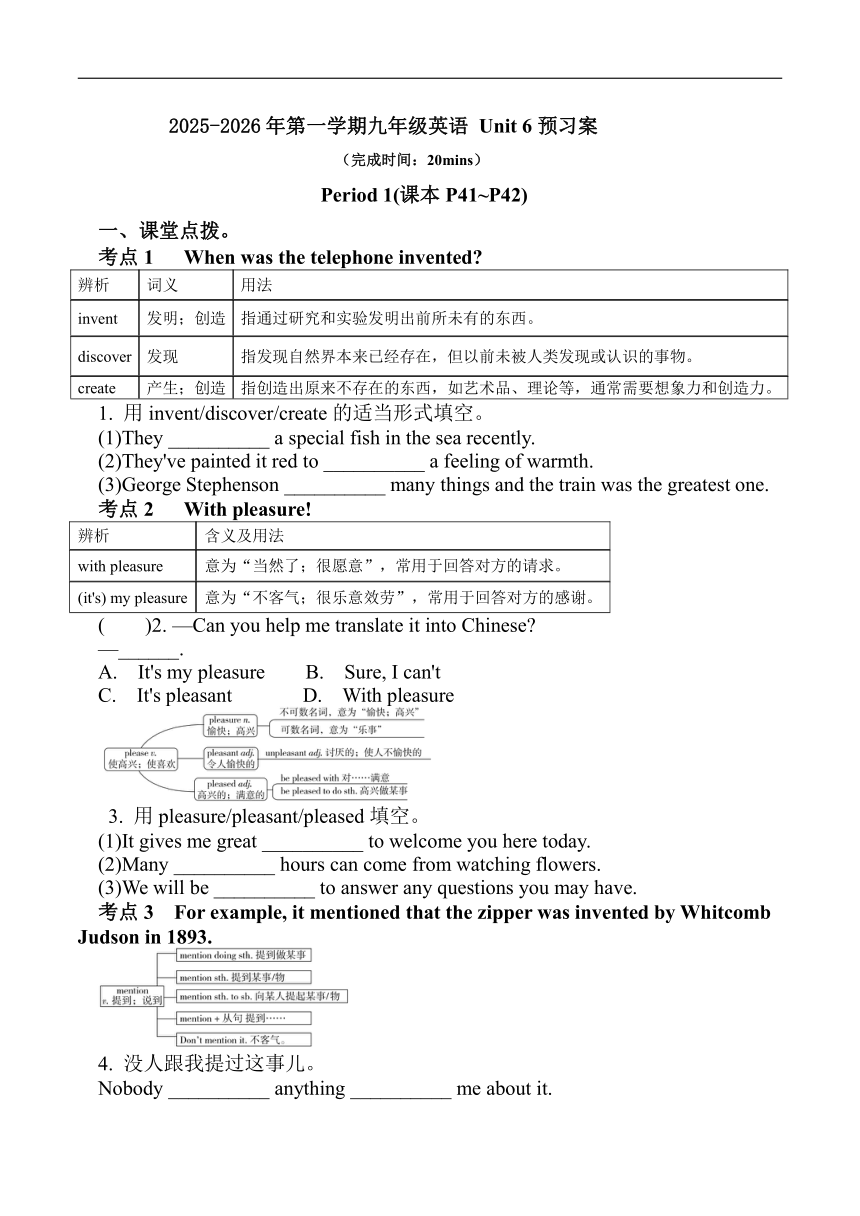
|
|
| 格式 | docx | ||
| 文件大小 | 217.4KB | ||
| 资源类型 | 教案 | ||
| 版本资源 | 人教新目标(Go for it)版 | ||
| 科目 | 英语 | ||
| 更新时间 | 2025-07-10 00:00:00 | ||
图片预览

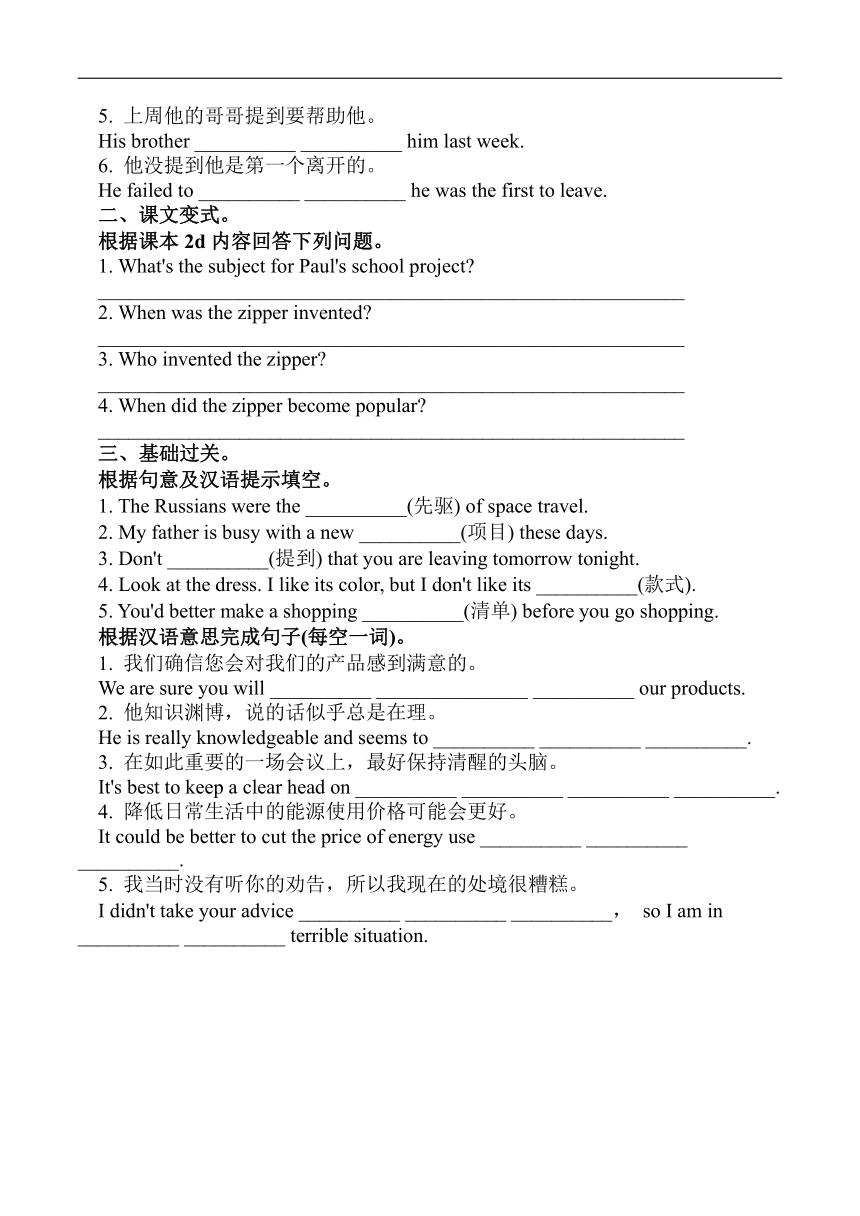
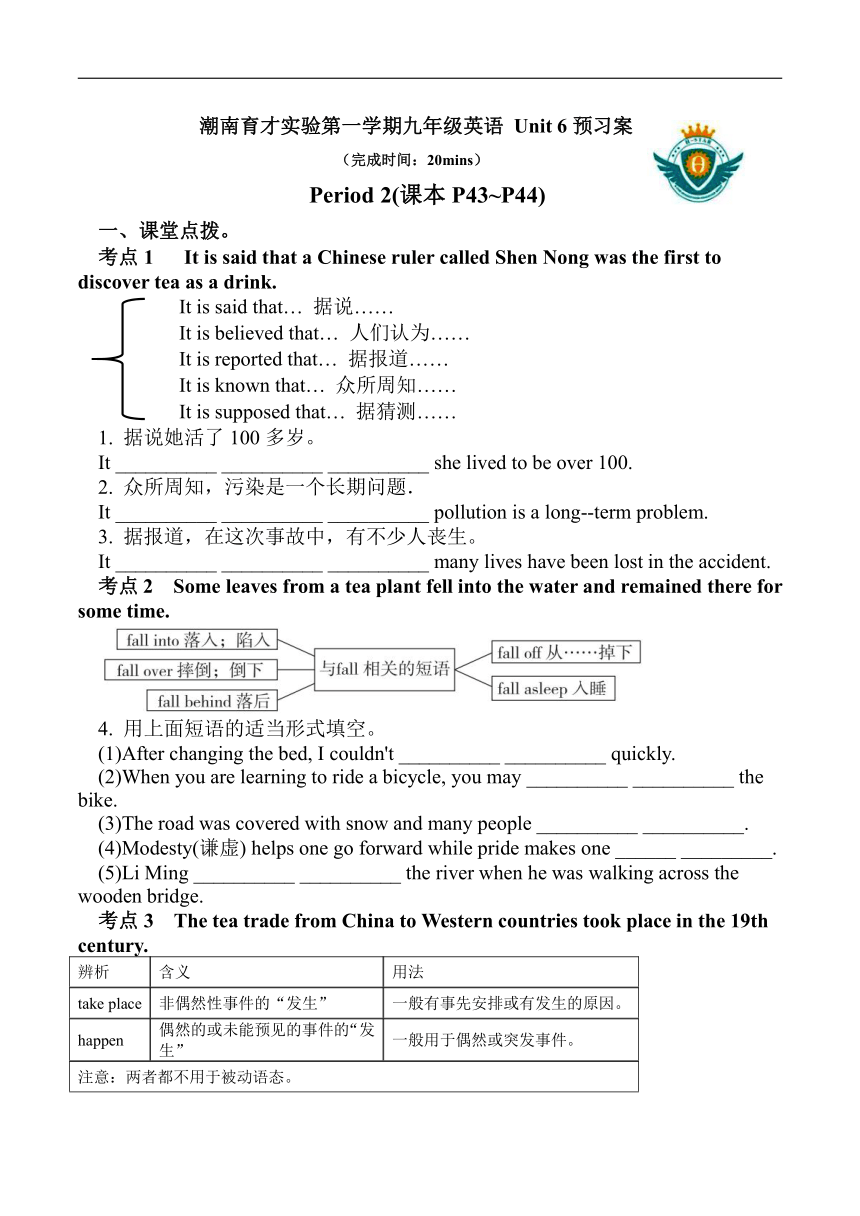
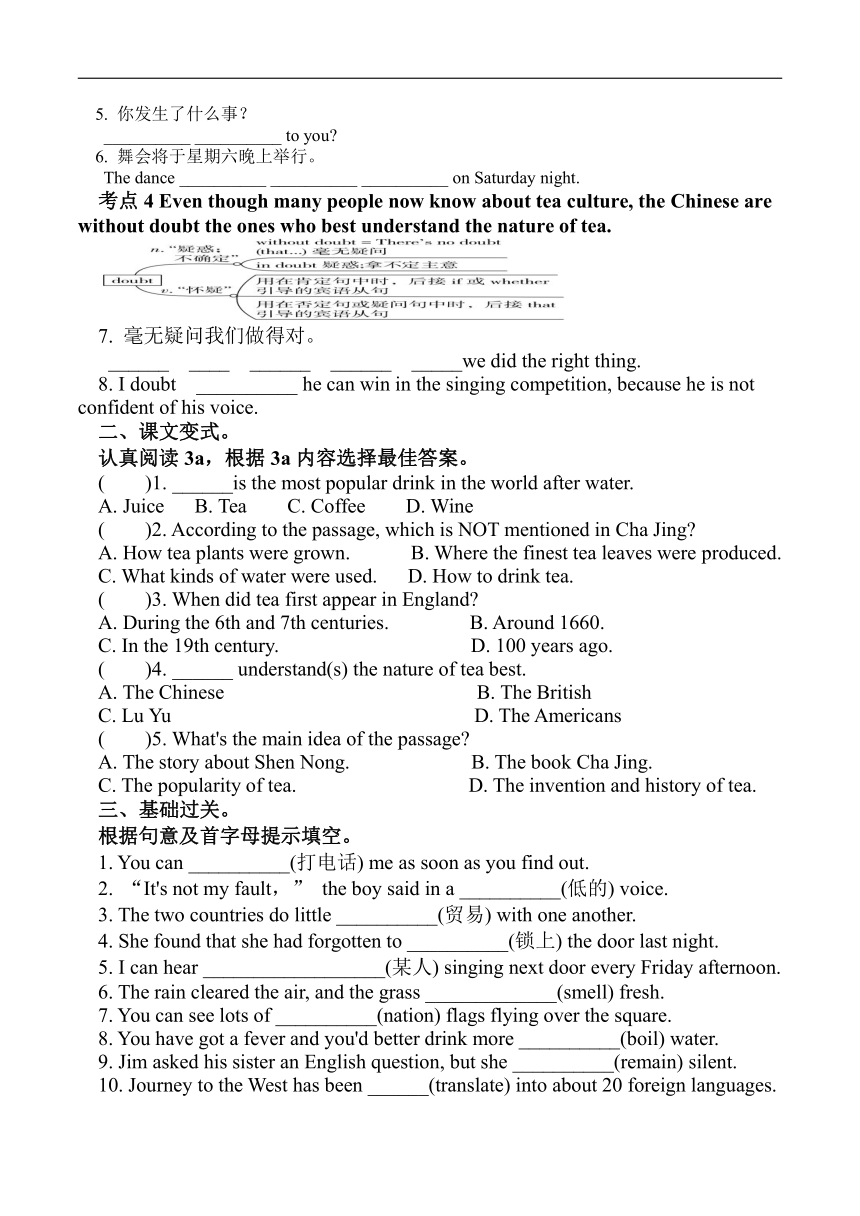
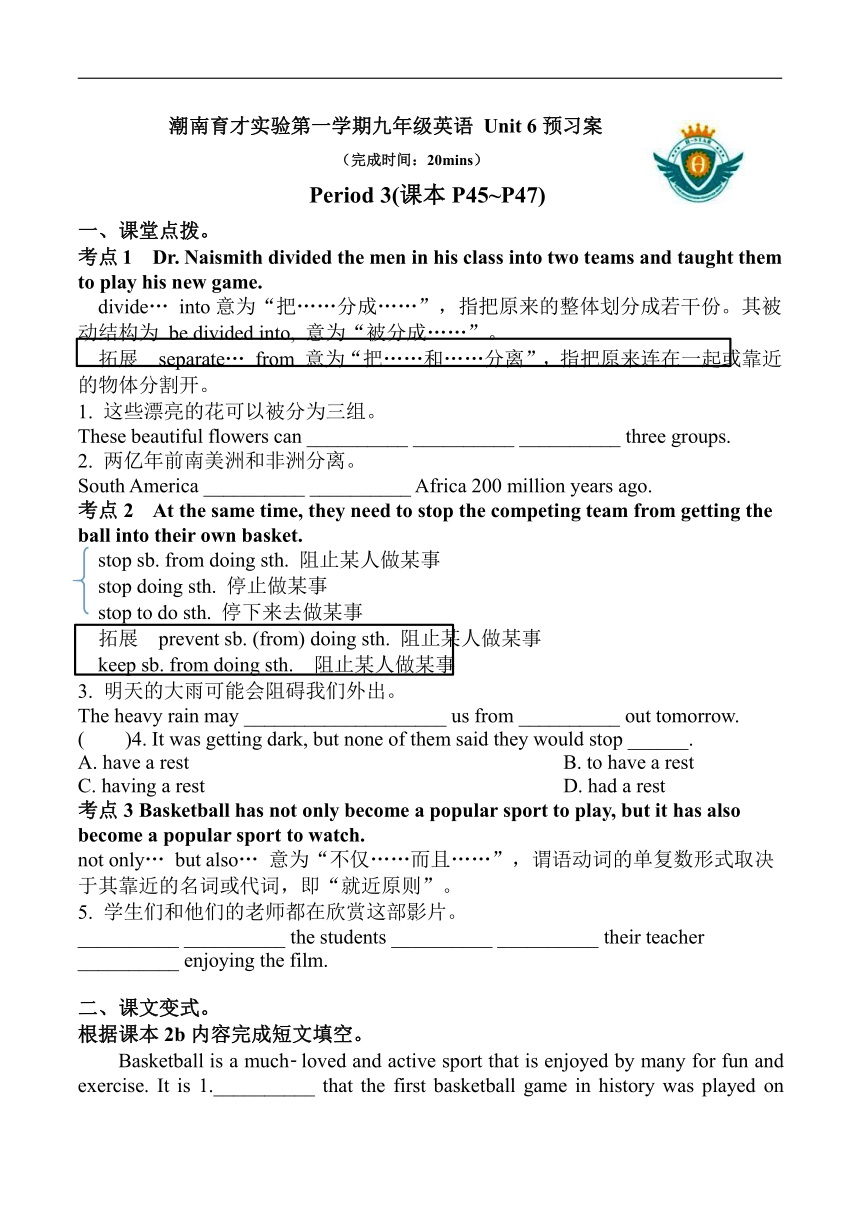
文档简介
2025-2026年第一学期九年级英语 Unit 6预习案
(完成时间:20mins)
Period 1(课本P41~P42)
一、课堂点拨。
考点1 When was the telephone invented
辨析 词义 用法
invent 发明;创造 指通过研究和实验发明出前所未有的东西。
discover 发现 指发现自然界本来已经存在,但以前未被人类发现或认识的事物。
create 产生;创造 指创造出原来不存在的东西,如艺术品、理论等,通常需要想象力和创造力。
1. 用invent/discover/create的适当形式填空。
(1)They __________ a special fish in the sea recently.
(2)They've painted it red to __________ a feeling of warmth.
(3)George Stephenson __________ many things and the train was the greatest one.
考点2 With pleasure!
辨析 含义及用法
with pleasure 意为“当然了;很愿意”,常用于回答对方的请求。
(it's) my pleasure 意为“不客气;很乐意效劳”,常用于回答对方的感谢。
( )2. —Can you help me translate it into Chinese
—______.
A. It's my pleasure B. Sure, I can't
C. It's pleasant D. With pleasure
3. 用pleasure/pleasant/pleased填空。
(1)It gives me great __________ to welcome you here today.
(2)Many __________ hours can come from watching flowers.
(3)We will be __________ to answer any questions you may have.
考点3 For example, it mentioned that the zipper was invented by Whitcomb Judson in 1893.
4. 没人跟我提过这事儿。
Nobody __________ anything __________ me about it.
5. 上周他的哥哥提到要帮助他。
His brother __________ __________ him last week.
6. 他没提到他是第一个离开的。
He failed to __________ __________ he was the first to leave.
二、课文变式。
根据课本2d内容回答下列问题。
1. What's the subject for Paul's school project
__________________________________________________________
2. When was the zipper invented
__________________________________________________________
3. Who invented the zipper
__________________________________________________________
4. When did the zipper become popular
__________________________________________________________
三、基础过关。
根据句意及汉语提示填空。
1. The Russians were the __________(先驱) of space travel.
2. My father is busy with a new __________(项目) these days.
3. Don't __________(提到) that you are leaving tomorrow tonight.
4. Look at the dress. I like its color, but I don't like its __________(款式).
5. You'd better make a shopping __________(清单) before you go shopping.
根据汉语意思完成句子(每空一词)。
1. 我们确信您会对我们的产品感到满意的。
We are sure you will __________ _______________ __________ our products.
2. 他知识渊博,说的话似乎总是在理。
He is really knowledgeable and seems to __________ __________ __________.
3. 在如此重要的一场会议上,最好保持清醒的头脑。
It's best to keep a clear head on __________ __________ __________ __________.
4. 降低日常生活中的能源使用价格可能会更好。
It could be better to cut the price of energy use __________ __________ __________.
5. 我当时没有听你的劝告,所以我现在的处境很糟糕。
I didn't take your advice __________ __________ __________, so I am in __________ __________ terrible situation.
潮南育才实验第一学期九年级英语 Unit 6预习案
(完成时间:20mins)
Period 2(课本P43~P44)
一、课堂点拨。
考点1 It is said that a Chinese ruler called Shen Nong was the first to discover tea as a drink.
It is said that… 据说……
It is believed that… 人们认为……
It is reported that… 据报道……
It is known that… 众所周知……
It is supposed that… 据猜测……
1. 据说她活了100多岁。
It __________ __________ __________ she lived to be over 100.
2. 众所周知,污染是一个长期问题.
It __________ __________ __________ pollution is a long- term problem.
3. 据报道,在这次事故中,有不少人丧生。
It __________ __________ __________ many lives have been lost in the accident.
考点2 Some leaves from a tea plant fell into the water and remained there for some time.
4. 用上面短语的适当形式填空。
(1)After changing the bed, I couldn't __________ __________ quickly.
(2)When you are learning to ride a bicycle, you may __________ __________ the bike.
(3)The road was covered with snow and many people __________ __________.
(4)Modesty(谦虚) helps one go forward while pride makes one ______ _________.
(5)Li Ming __________ __________ the river when he was walking across the wooden bridge.
考点3 The tea trade from China to Western countries took place in the 19th century.
辨析 含义 用法
take place 非偶然性事件的“发生” 一般有事先安排或有发生的原因。
happen 偶然的或未能预见的事件的“发生” 一般用于偶然或突发事件。
注意:两者都不用于被动语态。
5. 你发生了什么事?
__________ __________ to you
6. 舞会将于星期六晚上举行。
The dance __________ __________ __________ on Saturday night.
考点4 Even though many people now know about tea culture, the Chinese are without doubt the ones who best understand the nature of tea.
7. 毫无疑问我们做得对。
______ ____ ______ ______ _____we did the right thing.
8. I doubt __________ he can win in the singing competition, because he is not confident of his voice.
二、课文变式。
认真阅读3a,根据3a内容选择最佳答案。
( )1. ______is the most popular drink in the world after water.
A. Juice B. Tea C. Coffee D. Wine
( )2. According to the passage, which is NOT mentioned in Cha Jing
A. How tea plants were grown. B. Where the finest tea leaves were produced.
C. What kinds of water were used. D. How to drink tea.
( )3. When did tea first appear in England
A. During the 6th and 7th centuries. B. Around 1660.
C. In the 19th century. D. 100 years ago.
( )4. ______ understand(s) the nature of tea best.
A. The Chinese B. The British
C. Lu Yu D. The Americans
( )5. What's the main idea of the passage
A. The story about Shen Nong. B. The book Cha Jing.
C. The popularity of tea. D. The invention and history of tea.
三、基础过关。
根据句意及首字母提示填空。
1. You can __________(打电话) me as soon as you find out.
2. “It's not my fault,” the boy said in a __________(低的) voice.
3. The two countries do little __________(贸易) with one another.
4. She found that she had forgotten to __________(锁上) the door last night.
5. I can hear __________________(某人) singing next door every Friday afternoon.
6. The rain cleared the air, and the grass _____________(smell) fresh.
7. You can see lots of __________(nation) flags flying over the square.
8. You have got a fever and you'd better drink more __________(boil) water.
9. Jim asked his sister an English question, but she __________(remain) silent.
10. Journey to the West has been ______(translate) into about 20 foreign languages.
潮南育才实验第一学期九年级英语 Unit 6预习案
(完成时间:20mins)
Period 3(课本P45~P47)
一、课堂点拨。
考点1 Dr. Naismith divided the men in his class into two teams and taught them to play his new game.
divide… into意为“把……分成……”,指把原来的整体划分成若干份。其被动结构为 be divided into, 意为“被分成……”。
拓展 separate… from 意为“把……和……分离”,指把原来连在一起或靠近的物体分割开。
1. 这些漂亮的花可以被分为三组。
These beautiful flowers can __________ __________ __________ three groups.
2. 两亿年前南美洲和非洲分离。
South America __________ __________ Africa 200 million years ago.
考点2 At the same time, they need to stop the competing team from getting the ball into their own basket.
stop sb. from doing sth. 阻止某人做某事
stop doing sth. 停止做某事
stop to do sth. 停下来去做某事
拓展 prevent sb. (from) doing sth. 阻止某人做某事
keep sb. from doing sth. 阻止某人做某事
3. 明天的大雨可能会阻碍我们外出。
The heavy rain may ____________________ us from __________ out tomorrow.
( )4. It was getting dark, but none of them said they would stop ______.
A. have a rest B. to have a rest
C. having a rest D. had a rest
考点3 Basketball has not only become a popular sport to play, but it has also become a popular sport to watch.
not only… but also… 意为“不仅……而且……”,谓语动词的单复数形式取决于其靠近的名词或代词,即“就近原则”。
5. 学生们和他们的老师都在欣赏这部影片。
__________ __________ the students __________ __________ their teacher __________ enjoying the film.
二、课文变式。
根据课本2b内容完成短文填空。
Basketball is a much loved and active sport that is enjoyed by many for fun and exercise. It is 1.__________ that the first basketball game in history was played on December 21, 1891. Basketball was invented 2.__________ James Naismith. When he was a college teacher, he was asked to 3.__________ of a game that could be played in the winter. Dr. Naismith 4.__________ the men in his class into two teams and taught them to play his new game. Players on the same team must work together to get the ball into the other team's basket. At the same time, they need to stop the competing team from getting the ball into their 5.__________ basket.
In China, basketball has not only become a popular sport to play, but it has also 6.________ a popular sport to watch. 7.________________ America's NBA games are the most famous, the CBA games are becoming more 8.__________ in China. The number of foreign players, including Chinese players, in the NBA has increased. There are also 9.__________ and more foreign players in the CBA. Many young people 10.__________ up to these basketball heroes and want to become like them. These stars encourage young people to work hard to achieve their dreams.
三、基础过关。
根据汉语提示或用括号内所给单词的适当形式填空。
1. The museum was built in memory of those dead __________(hero).
2. They can bring two __________(basket) to buy fruit and vegetables.
3. The soup was __________(salt) because my mother added too much salt in it.
4. The main purpose of the advertisement is to make __________(customer) spend money.
5. Norman Bethune was a __________(Canada) doctor. He was well -known for helping Chinese people in the war(战争).
根据汉语意思完成句子(每空一词)。
1. 这两条河把我家乡分为了三部分。
The two rivers __________ my hometown __________ three parts.
2. 我昨天不巧错拿了你的书包。
I took your bag instead of mine __________ __________ yesterday.
3. 从四岁起,我就梦想成为一名飞行员。
Ever since I was four years old, I have ____________________ __________________ a pilot.
4. 她不但唱得动听,而且舞姿优美。
She __________ __________ sings well __________ __________ dances beautifully.
5. 凯西在学校很受欢迎,且很多学生都钦佩她。
Cathy is a popular girl at school and many students __________ __________ __________ her.
潮南育才实验第一学期九年级英语 Unit 6预习案
(完成时间:30mins)
Period 4(课本P47~P48)
一、自查资料,翻译以下句子。
There is no doubt that the computer has enriched my knowledge.
The computer is also good for relaxing myself.
I can keep in touch with others through the computer.
二、背记范文1,背诵之前,先自查资料,在有下划线的短语下面备注中文。
Hello, everyone! I am Wang Hua. It's a great honor for me to speak here. There are many great inventions in the world. My favorite invention is the computer.
First of all, I can know what is happening around the world and get more new information easily because of the computer. There is no doubt that the computer has enriched my knowledge. Secondly, the computer is also good for relaxing myself. I usually listen to music or watch movies on the computer. What's more, I can also make friends from all over the world and keep in touch with others through the computer.
In the future, I believe that the computer will be smarter and more powerful. Maybe it will look like a phone and we can carry it everywhere. How wonderful!
That's all for my speech. Thank you!
背记范文2,只看译文,独立默写全文在本子上。
How to become an inventor
Many people want to be an inventor.Would you like to be an inventor If so,as a student,you need to do these things.
Study hard. Knowledge is the base.If you don’t master any knowledge,it’s impossible to invent anything. Interest is the best teacher.When you are interested in something,you will do it well. So one should have interest in what you are studying.Creativity is very necessary.You need to be creative to come up with new ideas.
Finally,you should keep on studying hard and never give up. Don’t be afraid of failure. Then you are on the way to success.
译文:
如何成为一名发明家
许多人想成为发明家。你想成为一个发明家吗 如果是这样,作为一名学生,你需要做这些事情。
努力学习。知识是基础。如果你不掌握任何知识,就不可能发明任何东西。兴趣是最好的老师。当你对某件事感兴趣时,你就会把它做好。所以一个人应该对你正在学习的东西感兴趣。创造力是非常必要的。你需要有创造力来想出新的想法。
最后,你应该继续努力学习,永不放弃。不要害怕失败。那么你就走上了成功之路。
潮南育才实验第一学期九年级英语 Unit 6预习案
(完成时间:10mins)
单元语法专题——一般过去时的被动语态
一、语法精讲。
一、一般过去时的被动语态的构成
一般过去时态的被动语态表示在过去某一时间发生的被动性的动作,由“was/were+及物动词的过去分词+by+动作执行者”构成,无须说明动作的执行者时可省略“by+动作执行者”。
二、一般过去时的被动语态的句式变化
肯定句 主语+was/were+及物动词的过去分词+(by短语)+其他 These cakes were made by my sister last night.
否定句 主语+was/were+not+及物动词的过去分词+(by短语)+其他 The watch was not found yesterday afternoon.
一般疑问句 Was/Were+主语+及物动词的过去分词+(by短语)+其他 —Were the books written in English —Yes, they were./No, they weren't.
特殊疑问句 特殊疑问词+was/were+及物动词的过去分词+(by短语)+其他 When were the photos taken?
三、注意事项
1.含有双宾语的主动结构变被动结构时,不要忽略间接宾语前的介词。
We gave some flowers to Miss Gao on Teachers' Day.
→Some flowers were given to Miss Gao on Teachers' Day.
在教师节那天,我们给高老师送了一些花。
2.含有双宾语的主动结构变被动结构时,既可将间接宾语转化为主语,也可将直接宾语转化为主语。若将间接宾语转化为主语,则保留直接宾语;若将直接宾语转化为主语,则保留间接宾语,且在保留的间接宾语前加上介词to 或for。
My mother gave me a sweater as a birthday present last night.
→I was given a sweater as a birthday present by my mother last night.
→A sweater was given to me as a birthday present by my mother last night.
昨晚我的妈妈给了我一件毛衣作为生日礼物。
二、语法精练。
1. They grew tea plants here a few years ago. (改为被动语态)
_____________________________________
2. The boy was introduced to those people by the teacher. (对画线部分提问)
_______________________________________________________
3. A new mobile phone was bought for me by him last weekend. (改为主动语态)
_____________________________________________
4. The book was translated into English by her.
①改为否定句
___________________________________________________
②改为一般疑问句,并作肯定和否定回答
_________________________________________________
________________ _____/___________
5. I don't know. Where is this kind of cake sold (合并为一句话)
_________________________________________________
小语篇训练——语法选择。
In 1826, a Frenchman 1._________ Niepce needed pictures for his business .But he was not a good artist .2.________ he invented a very simple camera .He 3.______it in a window of his house and took a picture of his garden .That was the first photo.
The next important date in the history of photography was in 1837.That year, Daguere, 4.________ Frenchman, took a picture of his 5._________ .He used a new kind of camera in a different way. In his picture you could see everything very clearly, even the6._______ thing. This kind of photo was called a Daguerreotype.
Soon, other people began to use Daguerre’s way .Travelers brought back wonderful photos from all around the world .People took picture of famous buildings, cities and mountains.
In about 1840, photography was developed .Then photographers could take picture of people and 7.________ things .That was not simple .The photographers had to carry a lot of film and other machines. But this did not stop them, for example, 8._______ in the United States worked so hard.
Mathew Brady was a famous American photographer. He took many pictures of great people .The picture were unusual because they were very lifelike.
Photographers also became one kind of art 9._______the end of the 19th century .Some photos were nor just copies of the real world .They showed and feelings, 10.____other kinds of art.
( )1.A. names B.named C.was named D.is named
( )2.A. But B.So C.And D.Therefore
( )3.A. put B.putted C.puts D.was put
( )4.A. other B.the other C.another D.others
( )5.A. reading’s room B.reading room C.read’s room D.read room
( )6.A. small B.smaller C.smallest D.more smaller
( )7.A. to move B.move C.moved D.moving
( )8.A. some B.any C.every D.many
( )9.A. by B.at C.in D.on
( )10.A. like B.as C.and D.so
(完成时间:20mins)
Period 1(课本P41~P42)
一、课堂点拨。
考点1 When was the telephone invented
辨析 词义 用法
invent 发明;创造 指通过研究和实验发明出前所未有的东西。
discover 发现 指发现自然界本来已经存在,但以前未被人类发现或认识的事物。
create 产生;创造 指创造出原来不存在的东西,如艺术品、理论等,通常需要想象力和创造力。
1. 用invent/discover/create的适当形式填空。
(1)They __________ a special fish in the sea recently.
(2)They've painted it red to __________ a feeling of warmth.
(3)George Stephenson __________ many things and the train was the greatest one.
考点2 With pleasure!
辨析 含义及用法
with pleasure 意为“当然了;很愿意”,常用于回答对方的请求。
(it's) my pleasure 意为“不客气;很乐意效劳”,常用于回答对方的感谢。
( )2. —Can you help me translate it into Chinese
—______.
A. It's my pleasure B. Sure, I can't
C. It's pleasant D. With pleasure
3. 用pleasure/pleasant/pleased填空。
(1)It gives me great __________ to welcome you here today.
(2)Many __________ hours can come from watching flowers.
(3)We will be __________ to answer any questions you may have.
考点3 For example, it mentioned that the zipper was invented by Whitcomb Judson in 1893.
4. 没人跟我提过这事儿。
Nobody __________ anything __________ me about it.
5. 上周他的哥哥提到要帮助他。
His brother __________ __________ him last week.
6. 他没提到他是第一个离开的。
He failed to __________ __________ he was the first to leave.
二、课文变式。
根据课本2d内容回答下列问题。
1. What's the subject for Paul's school project
__________________________________________________________
2. When was the zipper invented
__________________________________________________________
3. Who invented the zipper
__________________________________________________________
4. When did the zipper become popular
__________________________________________________________
三、基础过关。
根据句意及汉语提示填空。
1. The Russians were the __________(先驱) of space travel.
2. My father is busy with a new __________(项目) these days.
3. Don't __________(提到) that you are leaving tomorrow tonight.
4. Look at the dress. I like its color, but I don't like its __________(款式).
5. You'd better make a shopping __________(清单) before you go shopping.
根据汉语意思完成句子(每空一词)。
1. 我们确信您会对我们的产品感到满意的。
We are sure you will __________ _______________ __________ our products.
2. 他知识渊博,说的话似乎总是在理。
He is really knowledgeable and seems to __________ __________ __________.
3. 在如此重要的一场会议上,最好保持清醒的头脑。
It's best to keep a clear head on __________ __________ __________ __________.
4. 降低日常生活中的能源使用价格可能会更好。
It could be better to cut the price of energy use __________ __________ __________.
5. 我当时没有听你的劝告,所以我现在的处境很糟糕。
I didn't take your advice __________ __________ __________, so I am in __________ __________ terrible situation.
潮南育才实验第一学期九年级英语 Unit 6预习案
(完成时间:20mins)
Period 2(课本P43~P44)
一、课堂点拨。
考点1 It is said that a Chinese ruler called Shen Nong was the first to discover tea as a drink.
It is said that… 据说……
It is believed that… 人们认为……
It is reported that… 据报道……
It is known that… 众所周知……
It is supposed that… 据猜测……
1. 据说她活了100多岁。
It __________ __________ __________ she lived to be over 100.
2. 众所周知,污染是一个长期问题.
It __________ __________ __________ pollution is a long- term problem.
3. 据报道,在这次事故中,有不少人丧生。
It __________ __________ __________ many lives have been lost in the accident.
考点2 Some leaves from a tea plant fell into the water and remained there for some time.
4. 用上面短语的适当形式填空。
(1)After changing the bed, I couldn't __________ __________ quickly.
(2)When you are learning to ride a bicycle, you may __________ __________ the bike.
(3)The road was covered with snow and many people __________ __________.
(4)Modesty(谦虚) helps one go forward while pride makes one ______ _________.
(5)Li Ming __________ __________ the river when he was walking across the wooden bridge.
考点3 The tea trade from China to Western countries took place in the 19th century.
辨析 含义 用法
take place 非偶然性事件的“发生” 一般有事先安排或有发生的原因。
happen 偶然的或未能预见的事件的“发生” 一般用于偶然或突发事件。
注意:两者都不用于被动语态。
5. 你发生了什么事?
__________ __________ to you
6. 舞会将于星期六晚上举行。
The dance __________ __________ __________ on Saturday night.
考点4 Even though many people now know about tea culture, the Chinese are without doubt the ones who best understand the nature of tea.
7. 毫无疑问我们做得对。
______ ____ ______ ______ _____we did the right thing.
8. I doubt __________ he can win in the singing competition, because he is not confident of his voice.
二、课文变式。
认真阅读3a,根据3a内容选择最佳答案。
( )1. ______is the most popular drink in the world after water.
A. Juice B. Tea C. Coffee D. Wine
( )2. According to the passage, which is NOT mentioned in Cha Jing
A. How tea plants were grown. B. Where the finest tea leaves were produced.
C. What kinds of water were used. D. How to drink tea.
( )3. When did tea first appear in England
A. During the 6th and 7th centuries. B. Around 1660.
C. In the 19th century. D. 100 years ago.
( )4. ______ understand(s) the nature of tea best.
A. The Chinese B. The British
C. Lu Yu D. The Americans
( )5. What's the main idea of the passage
A. The story about Shen Nong. B. The book Cha Jing.
C. The popularity of tea. D. The invention and history of tea.
三、基础过关。
根据句意及首字母提示填空。
1. You can __________(打电话) me as soon as you find out.
2. “It's not my fault,” the boy said in a __________(低的) voice.
3. The two countries do little __________(贸易) with one another.
4. She found that she had forgotten to __________(锁上) the door last night.
5. I can hear __________________(某人) singing next door every Friday afternoon.
6. The rain cleared the air, and the grass _____________(smell) fresh.
7. You can see lots of __________(nation) flags flying over the square.
8. You have got a fever and you'd better drink more __________(boil) water.
9. Jim asked his sister an English question, but she __________(remain) silent.
10. Journey to the West has been ______(translate) into about 20 foreign languages.
潮南育才实验第一学期九年级英语 Unit 6预习案
(完成时间:20mins)
Period 3(课本P45~P47)
一、课堂点拨。
考点1 Dr. Naismith divided the men in his class into two teams and taught them to play his new game.
divide… into意为“把……分成……”,指把原来的整体划分成若干份。其被动结构为 be divided into, 意为“被分成……”。
拓展 separate… from 意为“把……和……分离”,指把原来连在一起或靠近的物体分割开。
1. 这些漂亮的花可以被分为三组。
These beautiful flowers can __________ __________ __________ three groups.
2. 两亿年前南美洲和非洲分离。
South America __________ __________ Africa 200 million years ago.
考点2 At the same time, they need to stop the competing team from getting the ball into their own basket.
stop sb. from doing sth. 阻止某人做某事
stop doing sth. 停止做某事
stop to do sth. 停下来去做某事
拓展 prevent sb. (from) doing sth. 阻止某人做某事
keep sb. from doing sth. 阻止某人做某事
3. 明天的大雨可能会阻碍我们外出。
The heavy rain may ____________________ us from __________ out tomorrow.
( )4. It was getting dark, but none of them said they would stop ______.
A. have a rest B. to have a rest
C. having a rest D. had a rest
考点3 Basketball has not only become a popular sport to play, but it has also become a popular sport to watch.
not only… but also… 意为“不仅……而且……”,谓语动词的单复数形式取决于其靠近的名词或代词,即“就近原则”。
5. 学生们和他们的老师都在欣赏这部影片。
__________ __________ the students __________ __________ their teacher __________ enjoying the film.
二、课文变式。
根据课本2b内容完成短文填空。
Basketball is a much loved and active sport that is enjoyed by many for fun and exercise. It is 1.__________ that the first basketball game in history was played on December 21, 1891. Basketball was invented 2.__________ James Naismith. When he was a college teacher, he was asked to 3.__________ of a game that could be played in the winter. Dr. Naismith 4.__________ the men in his class into two teams and taught them to play his new game. Players on the same team must work together to get the ball into the other team's basket. At the same time, they need to stop the competing team from getting the ball into their 5.__________ basket.
In China, basketball has not only become a popular sport to play, but it has also 6.________ a popular sport to watch. 7.________________ America's NBA games are the most famous, the CBA games are becoming more 8.__________ in China. The number of foreign players, including Chinese players, in the NBA has increased. There are also 9.__________ and more foreign players in the CBA. Many young people 10.__________ up to these basketball heroes and want to become like them. These stars encourage young people to work hard to achieve their dreams.
三、基础过关。
根据汉语提示或用括号内所给单词的适当形式填空。
1. The museum was built in memory of those dead __________(hero).
2. They can bring two __________(basket) to buy fruit and vegetables.
3. The soup was __________(salt) because my mother added too much salt in it.
4. The main purpose of the advertisement is to make __________(customer) spend money.
5. Norman Bethune was a __________(Canada) doctor. He was well -known for helping Chinese people in the war(战争).
根据汉语意思完成句子(每空一词)。
1. 这两条河把我家乡分为了三部分。
The two rivers __________ my hometown __________ three parts.
2. 我昨天不巧错拿了你的书包。
I took your bag instead of mine __________ __________ yesterday.
3. 从四岁起,我就梦想成为一名飞行员。
Ever since I was four years old, I have ____________________ __________________ a pilot.
4. 她不但唱得动听,而且舞姿优美。
She __________ __________ sings well __________ __________ dances beautifully.
5. 凯西在学校很受欢迎,且很多学生都钦佩她。
Cathy is a popular girl at school and many students __________ __________ __________ her.
潮南育才实验第一学期九年级英语 Unit 6预习案
(完成时间:30mins)
Period 4(课本P47~P48)
一、自查资料,翻译以下句子。
There is no doubt that the computer has enriched my knowledge.
The computer is also good for relaxing myself.
I can keep in touch with others through the computer.
二、背记范文1,背诵之前,先自查资料,在有下划线的短语下面备注中文。
Hello, everyone! I am Wang Hua. It's a great honor for me to speak here. There are many great inventions in the world. My favorite invention is the computer.
First of all, I can know what is happening around the world and get more new information easily because of the computer. There is no doubt that the computer has enriched my knowledge. Secondly, the computer is also good for relaxing myself. I usually listen to music or watch movies on the computer. What's more, I can also make friends from all over the world and keep in touch with others through the computer.
In the future, I believe that the computer will be smarter and more powerful. Maybe it will look like a phone and we can carry it everywhere. How wonderful!
That's all for my speech. Thank you!
背记范文2,只看译文,独立默写全文在本子上。
How to become an inventor
Many people want to be an inventor.Would you like to be an inventor If so,as a student,you need to do these things.
Study hard. Knowledge is the base.If you don’t master any knowledge,it’s impossible to invent anything. Interest is the best teacher.When you are interested in something,you will do it well. So one should have interest in what you are studying.Creativity is very necessary.You need to be creative to come up with new ideas.
Finally,you should keep on studying hard and never give up. Don’t be afraid of failure. Then you are on the way to success.
译文:
如何成为一名发明家
许多人想成为发明家。你想成为一个发明家吗 如果是这样,作为一名学生,你需要做这些事情。
努力学习。知识是基础。如果你不掌握任何知识,就不可能发明任何东西。兴趣是最好的老师。当你对某件事感兴趣时,你就会把它做好。所以一个人应该对你正在学习的东西感兴趣。创造力是非常必要的。你需要有创造力来想出新的想法。
最后,你应该继续努力学习,永不放弃。不要害怕失败。那么你就走上了成功之路。
潮南育才实验第一学期九年级英语 Unit 6预习案
(完成时间:10mins)
单元语法专题——一般过去时的被动语态
一、语法精讲。
一、一般过去时的被动语态的构成
一般过去时态的被动语态表示在过去某一时间发生的被动性的动作,由“was/were+及物动词的过去分词+by+动作执行者”构成,无须说明动作的执行者时可省略“by+动作执行者”。
二、一般过去时的被动语态的句式变化
肯定句 主语+was/were+及物动词的过去分词+(by短语)+其他 These cakes were made by my sister last night.
否定句 主语+was/were+not+及物动词的过去分词+(by短语)+其他 The watch was not found yesterday afternoon.
一般疑问句 Was/Were+主语+及物动词的过去分词+(by短语)+其他 —Were the books written in English —Yes, they were./No, they weren't.
特殊疑问句 特殊疑问词+was/were+及物动词的过去分词+(by短语)+其他 When were the photos taken?
三、注意事项
1.含有双宾语的主动结构变被动结构时,不要忽略间接宾语前的介词。
We gave some flowers to Miss Gao on Teachers' Day.
→Some flowers were given to Miss Gao on Teachers' Day.
在教师节那天,我们给高老师送了一些花。
2.含有双宾语的主动结构变被动结构时,既可将间接宾语转化为主语,也可将直接宾语转化为主语。若将间接宾语转化为主语,则保留直接宾语;若将直接宾语转化为主语,则保留间接宾语,且在保留的间接宾语前加上介词to 或for。
My mother gave me a sweater as a birthday present last night.
→I was given a sweater as a birthday present by my mother last night.
→A sweater was given to me as a birthday present by my mother last night.
昨晚我的妈妈给了我一件毛衣作为生日礼物。
二、语法精练。
1. They grew tea plants here a few years ago. (改为被动语态)
_____________________________________
2. The boy was introduced to those people by the teacher. (对画线部分提问)
_______________________________________________________
3. A new mobile phone was bought for me by him last weekend. (改为主动语态)
_____________________________________________
4. The book was translated into English by her.
①改为否定句
___________________________________________________
②改为一般疑问句,并作肯定和否定回答
_________________________________________________
________________ _____/___________
5. I don't know. Where is this kind of cake sold (合并为一句话)
_________________________________________________
小语篇训练——语法选择。
In 1826, a Frenchman 1._________ Niepce needed pictures for his business .But he was not a good artist .2.________ he invented a very simple camera .He 3.______it in a window of his house and took a picture of his garden .That was the first photo.
The next important date in the history of photography was in 1837.That year, Daguere, 4.________ Frenchman, took a picture of his 5._________ .He used a new kind of camera in a different way. In his picture you could see everything very clearly, even the6._______ thing. This kind of photo was called a Daguerreotype.
Soon, other people began to use Daguerre’s way .Travelers brought back wonderful photos from all around the world .People took picture of famous buildings, cities and mountains.
In about 1840, photography was developed .Then photographers could take picture of people and 7.________ things .That was not simple .The photographers had to carry a lot of film and other machines. But this did not stop them, for example, 8._______ in the United States worked so hard.
Mathew Brady was a famous American photographer. He took many pictures of great people .The picture were unusual because they were very lifelike.
Photographers also became one kind of art 9._______the end of the 19th century .Some photos were nor just copies of the real world .They showed and feelings, 10.____other kinds of art.
( )1.A. names B.named C.was named D.is named
( )2.A. But B.So C.And D.Therefore
( )3.A. put B.putted C.puts D.was put
( )4.A. other B.the other C.another D.others
( )5.A. reading’s room B.reading room C.read’s room D.read room
( )6.A. small B.smaller C.smallest D.more smaller
( )7.A. to move B.move C.moved D.moving
( )8.A. some B.any C.every D.many
( )9.A. by B.at C.in D.on
( )10.A. like B.as C.and D.so
同课章节目录
- Unit 1 How can we become good learners.
- Section A
- Section B
- Unit 2 I think that mooncakes are delicious!
- Section A
- Section B
- Unit 3 Could you please tell me where the restroom
- Section A
- Section B
- Unit 4 I used to be afraid of the dark.
- Section A
- Section B
- Unit 5 What are the shirts made of?
- Section A
- Section B
- Review of Units 1-5
- Unit 6 When was it invented?
- Section A
- Section B
- Unit 7 Teenagers should be allowed to choose their
- Section A
- Section B
- Unit 8 It must belong to Carla.
- Section A
- Section B
- Unit 9 I like music that I can dance to.
- Section A
- Section B
- Unit 10 You're supposed to shake hands.
- Section A
- Section B
- Review of Units 6-10
- Unit 11 Sad movies make me cry.
- Section A
- Section B
- Unit 12 Life is full of the unexpected
- Section A
- Section B
- Unit 13 We're trying to save the earth!
- Section A
- Section B
- Unit 14 I remember meeting all of you in Grade 7.
- Section A
- Section B
- Review of Units 11-14
